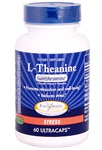| L-theanine is involved in the formation of the inhibitory neurotransmitter, gamma amino butyric acid (GABA). GABA influences the levels of two other neurotransmitters, dopamine and serotonin, producing a relaxation effect. GABA serves a sedative function that
brings balance to excitability that can lead to restlessness, insomnia, and other disruptive conditions. Theanine also appears to increase levels of dopamine, another brain chemical with mood-enhancing effects, which can reduce blood pressure.
L-theanine is an amino acid that helps promote a mild, restful, relaxed state without diminishing daytime alertness. Stress impairs the immune system, leaving us vulnerable to opportunistic infections, and can cause depression. People under stress can mitigate many of the harmful effects of stress with l-theanine. L-theanine reduces stress and anxiety without the tranquilizing effects found in many other calming supplements.
Theanine has a reputation for promoting mental and physical relaxation, and decreasing stress and anxiety without inducing drowsiness, as measured by increased generation of alpha-waves. L-theanine directly stimulates the production of alpha brain waves. By increasing the brain's output of alpha waves, theanine may control anxiety, increase mental focus, improve concentration, and promote creativity.
Theanine may improve learning ability and sensations of pleasure by affecting dopamine and serotonin neurotransmitters in the brain. L-theanine has a significant effect on the release or reduction of neurotransmitters like dopamine and serotonin, resulting in improved memory and learning ability. L-theanine may also influence emotions due to its effects on the increased release of dopamine. L-theanine reduces brain serotonin concentration by either curtailing serotonin synthesis or increasing degradation in the brain. Theanine exerts protective effects on the brain by antagonizing glutamate toxicity.
Theanine has been found to be increasingly associated with therapeutic benefits in the areas of cardiovascular health and cancer treatment. Theanine helps to reduce the side effects and enhance the antitumour efficacy of chemotherapy. L-theanine has exhibited anticancer effects and an ability to favorably modulate the activity of some anticancer drugs. | 